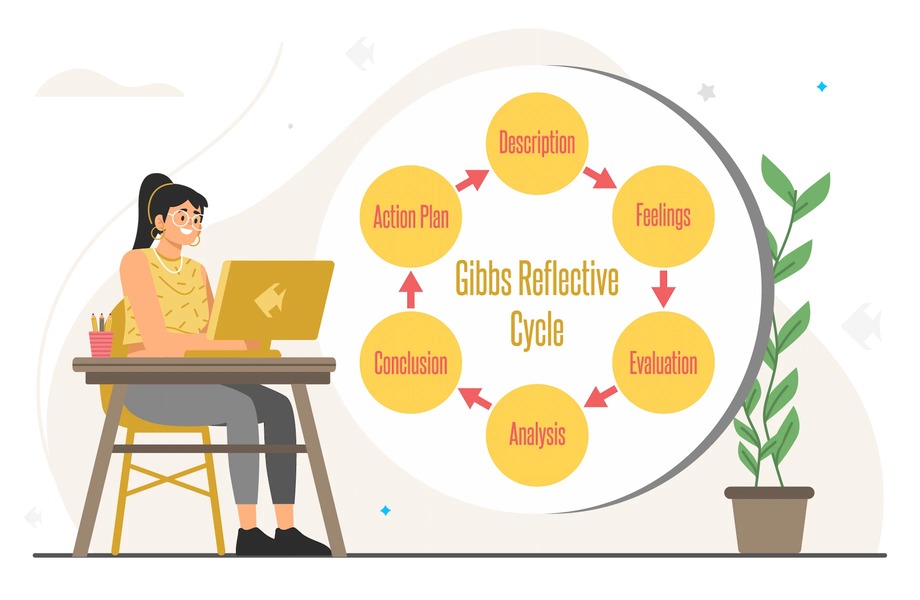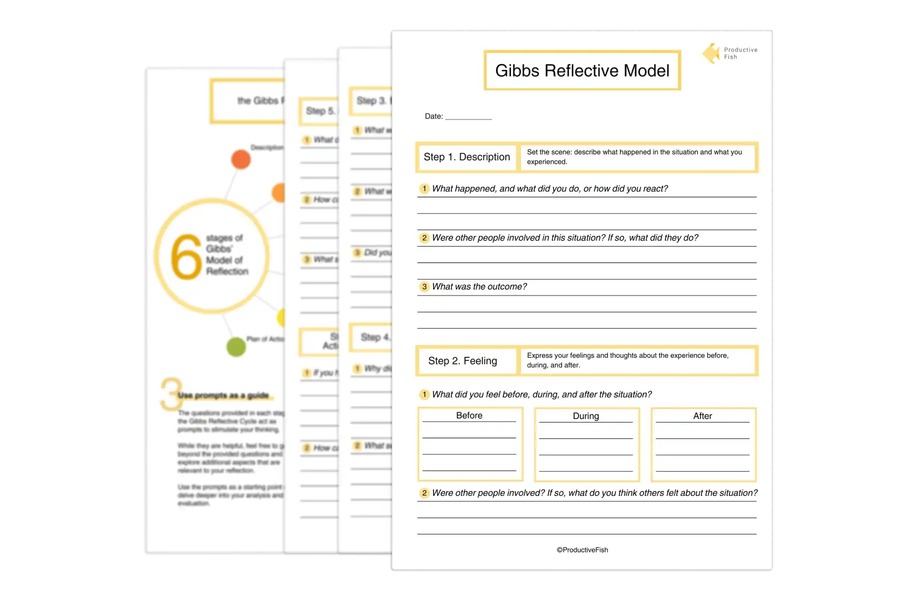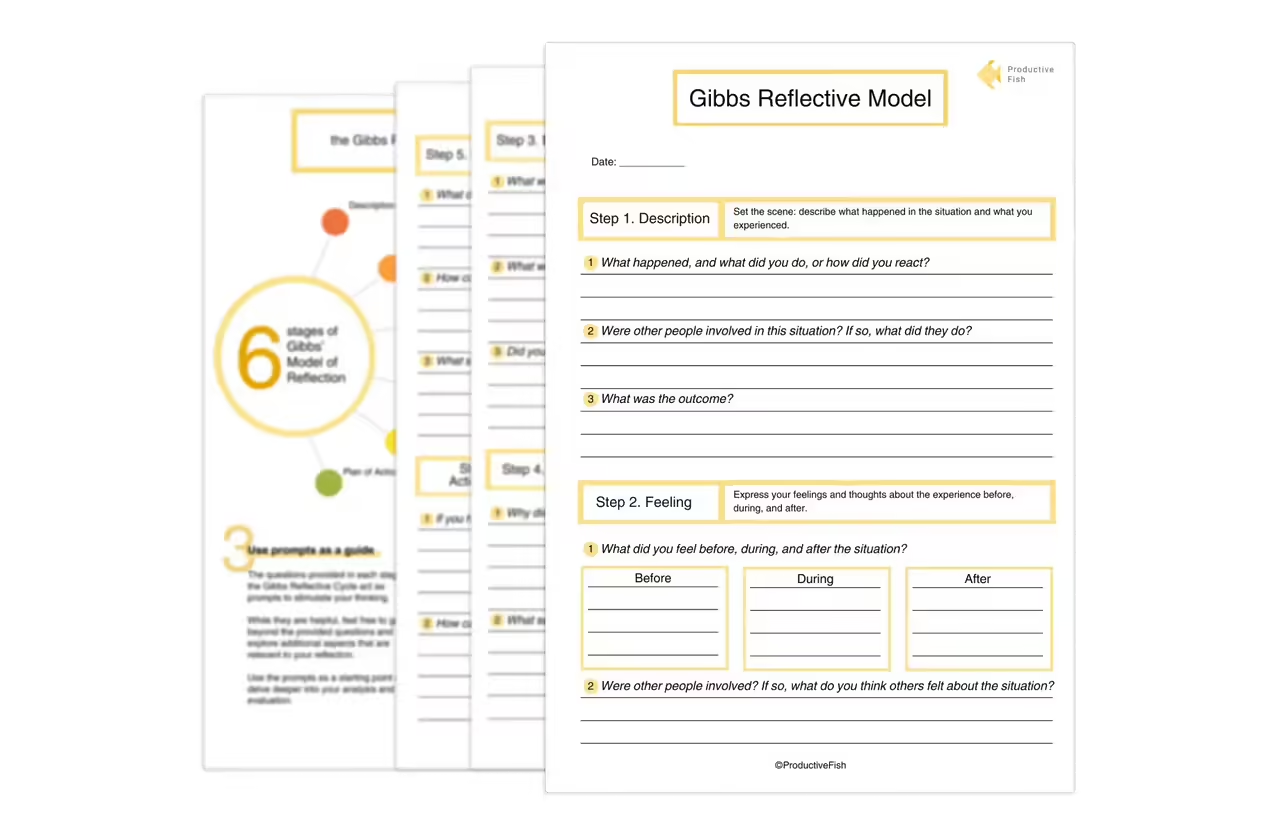6 Stages of Gibbs’ Reflective Cycle
Updated on 23 Apr 2024 • 7 min read • posted by Maria H
Human beings like to learn and improve from experiences, but this process requires an element of introspection. This means that experiencing something isn’t enough in itself to learn from it. Indeed, you also need to consciously think about your experiences, reflect on them and assess what can be done better. Only then will you improve and get better results the next time.

What is the Gibbs' Reflective Cycle
The Gibbs' Reflective Cycle approach aims at providing you with the right tools to understand this "learning from experience" process and make the most of it. Note that this method can be applied in many different situations, such as self-improvement, coaching, or mentoring, but it's most commonly used to describe the way people learn about their own behaviors and thoughts.
Gibbs' reflective cycle is named for its creator, scientist J. W. Gibbs. Back in 1988, he wrote a book called "Learning by Doing" that helped to revolutionize teaching methods in education. Alongside Bob Farmer and Diana Eastcott, Gibbs emphasized the importance of critical reflection and created the reflective cycle as a tool for improving learning through experience. Today, it's still considered one of the best ways for people to understand how they learn from experience.
Why is Gibbs' Cycle of Reflection Important
According to Gibbs, reflecting on your learning experience assists you in improving your performance both in the present and future.
Using this reflection technique on your own learning will increase your productivity and the quality of work for next time. Graham Gibbs claims that it is challenging to learn only by experiencing the situation/event/activity; thus, reflection is essential. Even nurses apply Gibbs’ cycle of reflection while working with patients as it can enable them to identify their role in an incident and to help to understand how the incident might have been avoided.
Six Stages of Gibbs’ Model of Reflection
The Gibbs' reflective model is a framework giving structure into the process of learning from experiential learning through six stages: description, feelings, evaluation, analysis, conclusions, and plan of action.
Each of the six stages of Gibbs’ model encourages the individual to reflect on their experiences through questions.
Step 1. Description
During this step, the idea is for you to describe a situation and understand what happened in that specific situation. Some of the questions you can ask yourself to help include:
- What happened, and what did you do, or how did you react?
- Were other people involved in this situation? If so, what did they do?
- What was the outcome?
Note that during this stage, you should only state what happened and not give your opinion or jump to conclusions. Instead, try to describe the situation as it unfolded as accurately as possible.
Step 2. Feeling
During this stage, the self-reflection process will help you understand how you felt before, during, and after a situation and how your feelings might have impacted your experience. In order to self-improve, some of the relevant self-reflection questions to ask yourself include:
- What did you feel during the situation?
- What did you feel after the situation?
- Were other people involved in the situation? If so, what do you think others felt about the situation?
- What do you think other people feel about the situation now?
- What were you thinking during the situation?
- What do you think about the situation now?
This step is particularly important as the way you felt during a situation will determine whether you need to improve and work on yourself to feel better next time a similar situation arises.
Step 3. Evaluation
During the evaluation stage, the idea is for you to objectively look at the situation and try to understand what worked and what didn't. As a result, ensure you focus on both the positive and negative aspects of a situation to make the most of your personal reflection process. Some of the questions you should ask yourself include:
- What was good about the experience? What went well?
- What was negative about the experience or situation? What didn’t go well?
- Did you and other people contribute positively or negatively to the situation?
Step 4. Analysis
This is one of the most critical steps to the model. During the analysis stage, you’ll get a chance to understand why the experience was positive or negative. The model suggests that you separate what went well and what didn’t and question why. Some of the questions to ask yourself include:
- Why did things go well, or why didn’t they?
- What sense can I make of this experience?
- What additional knowledge can I use to help me better understand this experience?
Step 5. Conclusion
During this step, it’s time to draw conclusions about what happened. You’ll have the opportunity to sum up what you’ve learned so far and highlight what specific changes to your actions could help improve the future outcome. Some helpful self-reflection questions to ask yourself include:
- What did you learn from this situation?
- How could the situation have been more positive for everybody?
- What skills do you need to acquire to better deal with a similar situation in the future?
- What else could you have done during this situation?
Step 6. Plan of Action
This is your time to plan what you should do differently the next time a similar or related situation arises. Besides, not only should you plan what you would do differently, but you should also know how to make it happen. Some of the relevant questions you should ask yourself include:
- If you had to go through the same situation again, what would you do differently?
- How are you going to develop the skills you need to handle things better?
- How will you implement the new skills you have developed?
- How can you review your progress?
Gibbs’ Reflective Cycle Example
Now, to illustrate a cycle of reflection in action we will show what each of the 6 steps could look like in the example.
Description
My friends and I had planned a group vacation, and I eagerly anticipated joining them. However, my boss informed me that it was impossible for anyone to take time off during that period.
Feeling
I was excited about a much-needed vacation with my friends, but my job's unexpected interference left me feeling frustrated. However, my friends were understanding, they encouraged me and decided to reschedule our group holiday, which significantly improved my mood.
Evaluation
Such experience showed that I need to be more emotionally adaptable and confident in myself. I should focus on maintaining a healthy work-life balance and discuss potential bonuses with my boss for working during the holiday season. Moreover, I should appreciate the support my friends offered during this challenging time.
Analysis
Upon reflection, I realized that my vacation request might have been denied due to underlying issues at work. The issues may be communication or management problems that contributed to the team's subpar performance. Identifying these root causes will allow me to address them and prevent similar situations in the future. Also, I persuaded myself that this vacation definitely would happen and didn’t take into account that anything could go wrong. Consequently, I was deeply frustrated when my only plan A was ruined.
Conclusion
This situation taught me to critically assess my work performance and suggest improvements to the department's overall functioning. Besides, I have to learn more about myself, and my emotions by analyzing my current state of well-being. This proactive approach will help prevent such cases next time.
Plan of action
If something like this happens again, here's what I'll do to handle future situations better:
- Assess my contributions to the department and identify areas for improvement.
- Discuss with my boss the possibility of receiving compensation for working during holidays, using data to support my request.
- Develop strategies to communicate my needs and priorities effectively with my boss and colleagues, emphasizing the importance of vacation time for overall well-being.
- Reflect on overall well-being and read the article about how to improve emotional intelligence.
- Explore alternative options for taking time off, such as shorter trips or remote work arrangements, to maintain a healthy work-life balance.
Gibbs Reflective Cycle Template
To streamline your reflective process, we have designed a Gibbs' Reflective Cycle template that you can use immediately. This template neatly lays out all the stages in an orderly fashion for ease of understanding. Print the template and start your reflection session.

Get now for 3.99$
If you want to learn more about yourself and improve your wellness, visit our collection of well-being templates.
Advantages and Disadvantages of Reflective Cycle
As any practice cycle of reflection has its advantages and disadvantages. Identifying them could help you to understand how to use Gibbs’ model of reflection better for you.
Advantages:
- Easy to Understand. The reflective cycle is a straightforward framework that is easy to understand and apply. That makes it a useful tool for people who are new to reflective practice.
- Comprehensive. The cycle consists of six stages that cover different aspects of the reflective process, making it a complex tool for reflecting.
- Promotes Deeper Thinking. By encouraging examining experiences from multiple angles, Gibbs' Reflective Cycle helps to explore your thoughts more deeply which promotes a better understanding of the situation.
Disadvantages:
- Not Suitable for Everyone. Some people may find Gibbs' Reflective Cycle too structured or prescriptive, and may prefer a more open-ended approach to reflection.
- Can Be Time-Consuming. Going through all six stages of the cycle requires some time and effort, which may make it challenging for individuals with busy schedules or limited time.
- May Not Address Complex Issues. While Gibbs' Reflective Cycle is a useful tool for reflecting on straightforward experiences, it may not be suitable for more complex issues that require a more in-depth analysis.
Overall, Gibbs' Reflective Cycle is a useful tool for reflection, but it's important to remember that no single approach is suitable for everyone or every situation.
How Gibbs’ Reflective Cycle Helps
Research conducted in Korea has shown that this practice can have a positive impact on communication and confidence at work. And also reflection is a powerful tool for learning and personal growth. However, without clear criteria, it can be challenging to effectively engage with and track progress.
Rogers notes that when we try to make reflection serve everyone, we risk losing its power to truly make a difference, even though it's widely recognized as a valuable tool for personal and professional growth. It's better to recognize that different people may need different approaches to reflection, and that's okay.
So, the usage of Gibbs' reflective cycle gives a clear description of the situation, an analysis of feelings, an evaluation of the experience, and an analysis to make sense of the experience. And followed by conclusions on whether other options are considered and reflection upon experience to understand what you would do if the situation arose again.
If you want to make the most of your reflective practice, be sure to set clear criteria and stay focused on your goals throughout the process.
Final Reflection
Gibbs’ model of reflection is a "thinking" process. It begins with self-awareness, followed by asking questions such as: What happened? Why did it happen? Then gather and analyze your thoughts in order to gain a better understanding. Finally, you can use the results of your reflection to draw conclusions and make changes so that future outcomes are better.
